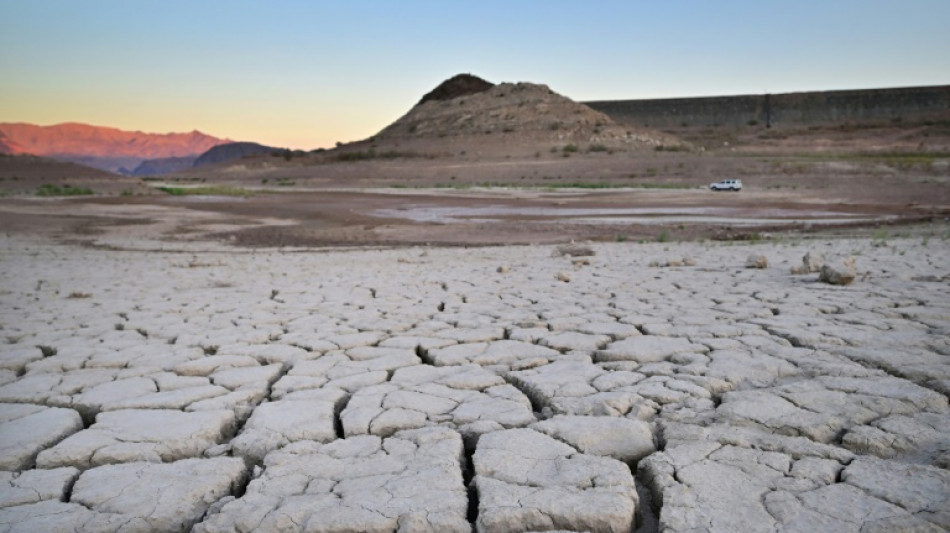
-
 Thousands demand lower rents at Barcelona demo
Thousands demand lower rents at Barcelona demo
-
'Puzzle' master Sinner powers champions Italy back into Davis Cup final

-
 Odegaard inspires Arsenal to reignite title hopes
Odegaard inspires Arsenal to reignite title hopes
-
Marseille down Lens to stay in touch with Ligue 1 leaders

-
 Novak Djokovic: All-conquering, divisive tennis superstar
Novak Djokovic: All-conquering, divisive tennis superstar
-
Scott Bessent a credible, safe pick for Treasury: experts

-
 World approves UN rules for carbon trading between nations at COP29
World approves UN rules for carbon trading between nations at COP29
-
Putin signs law letting Ukraine fighters write off bad debts

-
 Thousands march against Angola govt
Thousands march against Angola govt
-
Ireland coast to victory as they run Fiji ragged

-
 Atletico make comeback to beat Alaves as Simeone hits milestone
Atletico make comeback to beat Alaves as Simeone hits milestone
-
Aid only 'delaying deaths' as Sudan counts down to famine: agency chief

-
 Leipzig lose more ground on Bayern with Hoffenheim loss
Leipzig lose more ground on Bayern with Hoffenheim loss
-
Arsenal back to winning ways, Chelsea up to third in Premier League

-
 Sinner powers Davis Cup holders Italy past Australia to final
Sinner powers Davis Cup holders Italy past Australia to final
-
Andy Murray to coach Novak Djokovic

-
 Leipzig lose ground on Bayern, Dortmund and Leverkusen win
Leipzig lose ground on Bayern, Dortmund and Leverkusen win
-
Fear in central Beirut district hit by Israeli strikes

-
 Chinese film about Covid-19 wins Taiwan's top Golden Horse prizes
Chinese film about Covid-19 wins Taiwan's top Golden Horse prizes
-
Tuipulotu puts anger behind him as he captains Scotland against native Australia

-
 Inter smash Verona to take Serie A lead
Inter smash Verona to take Serie A lead
-
Mass rape trial sparks demonstrations across France

-
 Lebanon says 15 killed in Israeli strike on central Beirut
Lebanon says 15 killed in Israeli strike on central Beirut
-
Eddie Jones will revel in winding up England - Genge

-
 Chelsea see off Leicester on Maresca's King Power return
Chelsea see off Leicester on Maresca's King Power return
-
Storms bring chaos to Ireland, France, UK

-
 Berrettini gives Italy edge on Australia in Davis Cup semis
Berrettini gives Italy edge on Australia in Davis Cup semis
-
Amber Glenn storms to gold in Cup of China

-
 High-flying Chelsea see off Leicester
High-flying Chelsea see off Leicester
-
Climate-threatened nations stage protest at COP29 over contentious deal

-
 Families fleeing after 32 killed in new sectarian violence in Pakistan
Families fleeing after 32 killed in new sectarian violence in Pakistan
-
Ancelotti says 'ugly' to speculate about Mbappe mental health

-
 Failure haunts UN environment conferences
Failure haunts UN environment conferences
-
Colapinto in doubt for Las Vegas GP after crashing

-
 Lebanon says 11 killed in Israeli strike on central Beirut
Lebanon says 11 killed in Israeli strike on central Beirut
-
Three arrested in Spain for racist abuse at Liga Clasico

-
 Pope to skip Notre Dame opening for Corsica visit
Pope to skip Notre Dame opening for Corsica visit
-
Tokyo police care for lost umbrellas, keys, flying squirrels

-
 Neuville closes in on world title after Rally Japan recovery
Neuville closes in on world title after Rally Japan recovery
-
Jaiswal slams unbeaten 90 as India seize control against Australia

-
 'Nice surprise' for Verstappen to edge Norris in Las Vegas GP qualifying
'Nice surprise' for Verstappen to edge Norris in Las Vegas GP qualifying
-
Indian teen admits to 'some nerves' in bid for world chess crown

-
 Patrick Reed shoots rare 59 to make Hong Kong Open history
Patrick Reed shoots rare 59 to make Hong Kong Open history
-
Record-breaker Kane hits back after England criticism

-
 Cameron Smith jumps into lead at Australian PGA Championship
Cameron Smith jumps into lead at Australian PGA Championship
-
Russell on pole position at Las Vegas GP, Verstappen ahead of Norris

-
 Philippine VP made 'active threat' on Marcos' life: palace
Philippine VP made 'active threat' on Marcos' life: palace
-
Celtics labor to win over Wizards, Warriors into Cup quarters

-
 Balkans women stage ancient Greek play to condemn women's suffering in war
Balkans women stage ancient Greek play to condemn women's suffering in war
-
Nvidia CEO says will balance compliance and tech advances under Trump


US mulling forced cuts of Colorado River use as water dwindles
The US government announced Tuesday that it is considering imposing across-the-board cuts in usage of the dwindling Colorado River, after squabbling states failed to agree on how to deal with a decades-old problem.
Almost a quarter of a century of drought worsened by human-caused climate change, coupled with entrenched overuse, has left the once-mighty river severely depleted, with reservoirs at historic lows and hydropower generation threatened.
The river supplies water to around 40 million people in seven US states and Mexico, and irrigates millions of acres of fertile farmland that helps feed America.
But despite numerous deadlines, the states have been unable to agree on how to reduce their usage to prevent deadpool -- the point where intake pipes at the Hoover Dam will sit above the waterline and the river will effectively cease to flow.
The Bureau of Reclamation, the federal government department that manages water resources, said Tuesday it could impose mandatory cuts that would see users below Lake Mead -- California, Nevada and Arizona -- hit with a uniform percentage reduction.
That would upend a more than century-old method of divvying up the water which is based on a system of senior rights -- basically, who got there first -- with California's farmers near the front of the queue.
"Everybody understands the significance of the crisis," Deputy Interior Secretary Tommy Beaudreau said, according to the Los Angeles Times.
He noted that a wetter-than-average winter in the West was a boon for the river and would ease pressure this year, but was not a permanent fix.
"I think everybody understands that, as fortunate and thankful we are for the precipitation, that nobody’s off the hook, and that there needs to continue to be unity in trying to develop solutions," Beaudreau said.
- Mob murder victim -
The Bureau of Reclamation's proposal lays out two other options for the river: doing nothing, or cutting usage in line with the system of seniority.
Under the latter option, California's farmers would be almost entirely exempted while users that came to the table later would bear the brunt of the cuts.
That would hit Nevada and Arizona particularly hard, and could cut the drinking water available to the fast-growing city of Phoenix to almost nothing.
"Those are consequences that we would not allow to happen," Beaudreau told The New York Times.
But over-riding the so-called law of the river, and imposing a percentage cut on all users is likely to invite lawsuits from California's farmers, who for generations have enjoyed water plentiful enough to turn an otherwise arid near-desert into profitable farmland.
Last year water levels in Lake Mead dropped to their lowest since the Hoover Dam was built, exposing hillsides that have not been seen since the 1930s, and even uncovering the corpse of a suspected murder victim of the Las Vegas mob.
The Bureau of Reclamation's proposals, which will be finessed later this year, came after the states involved were unable to reach a decision.
Last year the federal government told Colorado, Arizona, New Mexico, California, Nevada, Utah and Wyoming to agree on how to reduce their usage by up to 40 percent of the river's flow.
A plan by six states, not including California, proposed that the bulk of cuts come from America's most populous state.
California countered with a suggestion that most of the cuts come from further upstream.
K.Brown--BTB
